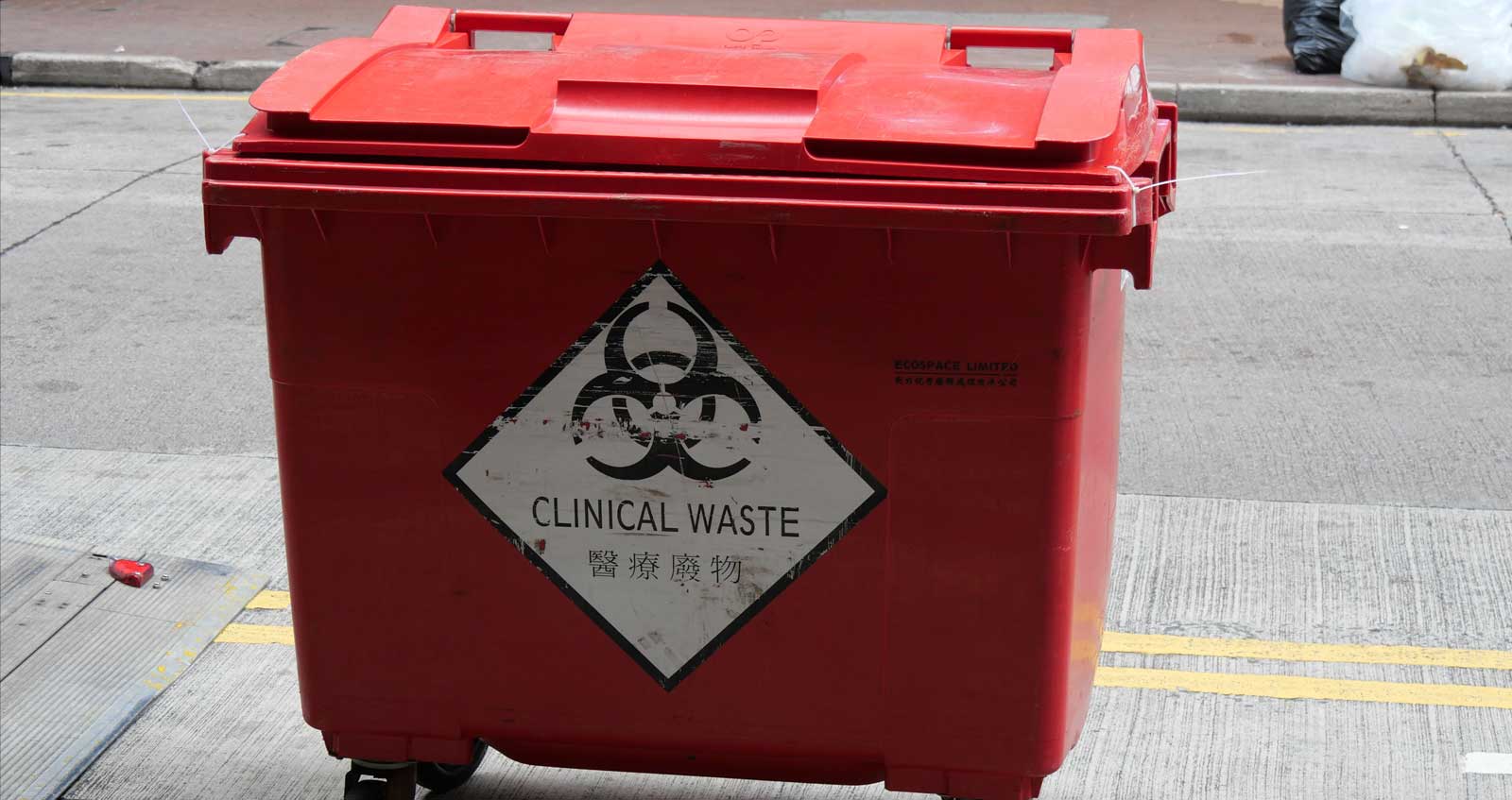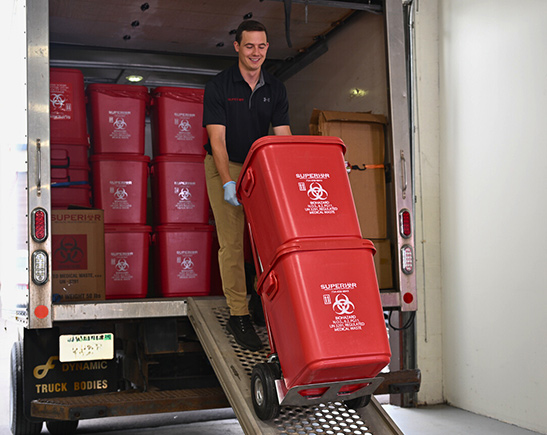Your Relied On Companion: Medical Waste Removal Services Tailored to Your Demands
Your Relied On Companion: Medical Waste Removal Services Tailored to Your Demands
Blog Article
The Importance of Appropriate Clinical Waste Disposal: A Guide for Medical Care Facilities
Appropriate medical waste disposal is an essential aspect of healthcare center monitoring, making certain the security and wellness of individuals, team, and the environment. From understanding the different categories of medical waste to abiding with regulative demands, healthcare centers need to embrace effective waste segregation practices and select appropriate disposal methods. However, the significance of appropriate clinical garbage disposal exceeds plain conformity; it is a duty that calls for recurring training and education and learning for personnel. In this overview, we will certainly explore the various elements of clinical garbage disposal and highlight the crucial steps that health care facilities must take. By applying these practices, medical care facilities can mitigate dangers, safeguard public health and wellness, and add to a cleaner, more secure environment.
Comprehending Medical Waste Categories
Recognizing clinical waste categories is critical for correct disposal in medical care centers. Clinical waste is a broad term that encompasses various sorts of waste created in health care setups, such as laboratories, clinics, and health centers. Classifying clinical waste helps make sure that it is taken care of, stored, and disposed of safely and according to applicable regulations.
There are several categories of medical waste that health care centers require to be knowledgeable about. These classifications include transmittable waste, sharps waste, pharmaceutical waste, chemical waste, and contaminated waste (medical waste disposal services with WasteX). Each category has details attributes and requires various disposal approaches to lessen the danger of harm to medical care employees, patients, and the environment
Infectious waste, for instance, describes waste contaminated with possibly transmittable materials, such as blood, body liquids, and tissues. Sharps waste includes needles, syringes, and other sharp things that can cause injury or send infections. Drug waste contains run out or unused medicines, while chemical waste contains hazardous chemicals made use of in medical procedures. Radioactive waste consists of products contaminated with radioactive compounds, such as nuclear medication products.
Conformity With Regulatory Demands
Healthcare facilities have to ensure conformity with regulatory needs for proper clinical waste disposal. Governing bodies, such as the Epa (EPA) and the Occupational Security and Health And Wellness Management (OSHA), have actually established guidelines and laws to protect public health and wellness and the environment. These laws detail the appropriate handling, storage, transportation, and disposal of clinical waste.
Compliance with governing demands is crucial for health care centers to avoid legal charges, reputational damage, and possible injury to human health and wellness and the atmosphere. Failing to adhere to these laws can lead to penalties, legal actions, and even the suspension or revocation of running licenses.
To make sure conformity, medical care centers need to develop comprehensive waste administration programs that consist of staff training, appropriate waste segregation, and using proper containers and tags. Regular audits and evaluations must also be performed to identify any kind of non-compliance problems and resolve them quickly.
It is essential for medical care centers to keep up to date with modifications in policies and upgrade their waste monitoring techniques as necessary. This can be accomplished by proactively monitoring updates from regulatory bodies and joining training programs and workshops.
Applying Reliable Waste Partition Practices
To ensure proper clinical garbage disposal, medical care centers must implement efficient waste segregation practices. Waste segregation is a critical action in the total waste administration process, as it helps lessen the threat of infection, prevents cross-contamination, and ensures the secure disposal of different sorts of waste. Reliable waste segregation methods entail dividing medical waste into different groups based on its qualities and potential risks.
One common method is the partition of sharps waste, such as scalpels and needles, from other kinds of clinical waste. Sharps waste should be put in puncture-resistant containers to protect against injuries and prospective infections. In addition, harmful waste, such as chemicals and pharmaceuticals, must be separated from general medical waste to avoid environmental contamination.
Proper labeling and color-coding of waste containers are essential for reliable waste partition. Clear and noticeable tags need to be placed on each container to show the sort of waste it has and any type of special delivery demands - medical waste disposal services with WasteX. Additionally, color-coding can be used to distinguish between various waste classifications, making it much easier for health care team to get rid of and determine of waste properly
Routine training and education and learning for health care team is crucial for the effective implementation of waste segregation techniques. Employee must be educated on the various waste categories, proper segregation techniques, and the significance of complying with waste read this post here management protocols. This will certainly assist make sure conformity and uniformity in waste segregation practices throughout the center.
Finding Appropriate Disposal Techniques
Correct selection of ideal disposal techniques is crucial in making sure the safe and ecologically accountable monitoring of medical waste in healthcare facilities. Health care centers produce a variety of medical waste, including sharps, medical waste disposal services with WasteX infectious waste, pharmaceutical waste, and chemical waste - medical waste removal services. Each kind of waste needs certain disposal approaches to lessen the threat of contamination, injury, and ecological harm
One usual disposal method for clinical waste is incineration. Incineration involves the controlled burning of waste at high temperatures.

Chemical sanitation is another method made use of for specific sorts of medical waste, such as pharmaceutical waste. This method makes use of chemicals to neutralize or ruin pollutants. It is crucial to select chemicals that are safe and eco friendly.
Sometimes, landfill disposal may appropriate for non-hazardous clinical waste (medical waste disposal services with WasteX). Nevertheless, proper partition and product packaging are vital to stop leak or contamination.
Eventually, medical care centers need to meticulously examine the attributes of their clinical waste and pick appropriate disposal techniques that focus on safety, environmental management, and regulative compliance. Routine training and monitoring are necessary to guarantee that medical care staff adheres to correct disposal protocols.

Training and Educating Team on Proper Disposal Procedures
Staff education and training play a vital duty in making certain the appropriate disposal of medical waste in healthcare centers. It is vital that all team participants, including doctors, registered nurses, technicians, and support personnel, get thorough training on appropriate disposal procedures. This training ought to cover the different sorts of medical waste, their prospective dangers, and the suitable methods for taking care of, segregating, and dealing with them.
Among the main objectives of personnel education and learning and training is to guarantee that all health care experts understand the relevance of appropriate disposal procedures and the potential repercussions of incorrect waste management. They need to be familiar with the dangers connected with medical waste, such as the transmission of infections and the contamination of the setting. medical waste removal near me. By understanding these risks, team member will be much more motivated to check here adhere to correct disposal protocols and take the needed precautions to safeguard themselves, their colleagues, and the neighborhood
Educating need to likewise cover the usage of personal safety devices (PPE) and the proper strategies for taking care of clinical waste. Personnel must be enlightened on exactly how to identify and set apart various kinds of waste, such as sharps, contagious waste, and harmful chemicals. They need to additionally be educated on the appropriate use waste containers, such as sharps containers and biohazard bags, as well as the value of labeling and securing these containers properly.
In addition, staff education and training ought to consist of regular updates and refresher course programs to ensure that health care experts stay notified about the most up to date regulations and best methods in medical garbage disposal. This recurring education and learning is crucial to maintain a high degree of recognition and compliance among team member.
Verdict
Finally, appropriate medical waste disposal is of utmost relevance for medical care centers. Comprehending the various classifications of clinical waste and adhering to governing demands makes certain the safety and security and well-being of both healthcare workers and the public. Applying reliable waste partition practices and choosing proper disposal approaches are essential in stopping the spread of contagious diseases and protecting the atmosphere. Last but not least, training and educating staff on correct disposal treatments is crucial for maintaining a tidy and safe medical care facility.
From understanding the different groups of medical waste to complying with governing demands, medical care centers must take on reliable waste segregation practices and select appropriate disposal techniques. These categories include infectious waste, sharps waste, pharmaceutical waste, chemical waste, and radioactive waste.To ensure correct clinical waste disposal, health care centers have to execute effective waste segregation practices. Waste segregation is a critical step in the overall waste management process, as it helps reduce the threat of infection, avoids cross-contamination, and makes sure the risk-free disposal of various kinds of waste. Medical care facilities generate a variety of clinical waste, including sharps, transmittable waste, pharmaceutical waste, and chemical waste.
Report this page